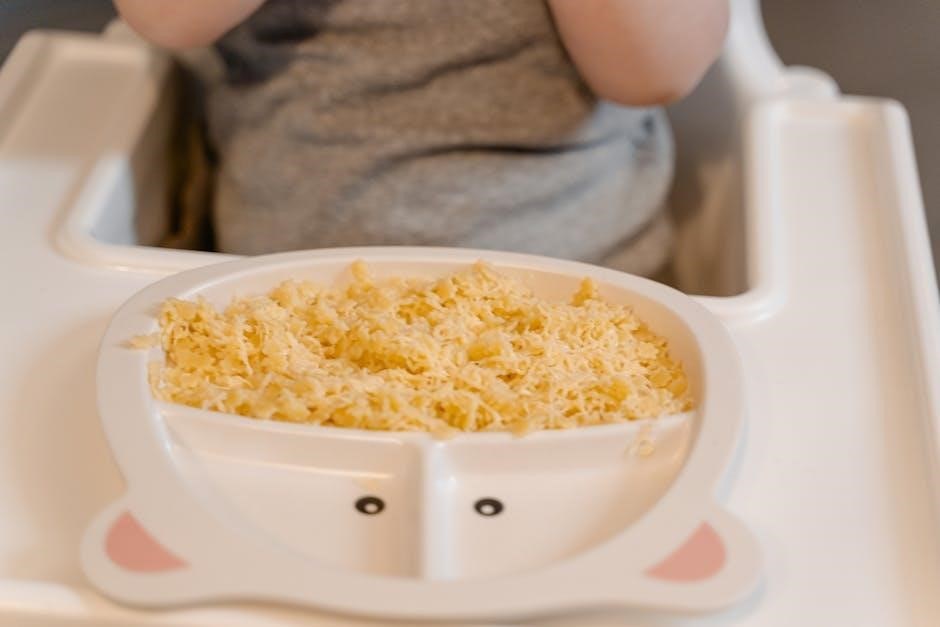
Lifestage dog food offers a tailored approach to feeding, acknowledging that nutritional needs evolve․ These foods are designed to suit specific ages, breeds, sizes, and activity levels, ensuring optimal support for health and well-being throughout a dog’s life․
Puppies require specific nutrients, vitamins, and minerals to support their rapid growth and development․ Puppy food is formulated to meet these needs, differing from adult or senior formulas․ These formulas ensure puppies receive proper nourishment․
The Importance of Lifestage Dog Food
Lifestage dog food represents a modern approach to canine nutrition, recognizing that a dog’s needs change throughout its life․ Unlike generic dog food, lifestage formulas are tailored to specific periods, such as puppyhood, adulthood, and senior years․ This targeted nutrition ensures that dogs receive the optimal balance of nutrients for their current stage of development and activity level․ For puppies, this means supporting rapid growth with high protein and essential fats․ As dogs age, formulas adjust to maintain a healthy weight and support joint health․
Lifestage dog food also considers breed size and activity levels․ Choosing the right lifestage food contributes significantly to a dog’s overall health, energy, and longevity․
Overview of Puppy Nutritional Needs
Puppies have unique nutritional requirements that differ significantly from adult dogs․ They require higher levels of protein to support rapid muscle and tissue development․ Fats are crucial for brain development and provide energy for their active lifestyle․ Carbohydrates offer another source of energy, ensuring puppies have the fuel they need for growth and play․ Vitamins and minerals, such as calcium and phosphorus, are essential for building strong bones and teeth․
DHA, an omega-3 fatty acid, supports healthy brain and eye development․ It’s vital to choose a puppy food formulated to meet these specific needs․ Failure to meet these nutritional demands can hinder growth and overall health․

Understanding Lifestage Puppy Food
What is Lifestage Dog Food?
Lifestage dog food is designed to meet the specific nutritional needs of dogs during different life stages․ These stages include puppyhood, adulthood, and senior years, each with unique dietary requirements․
What is Lifestage Dog Food?
Lifestage dog food represents a modern approach to canine nutrition, meticulously crafted to cater to the evolving needs of dogs throughout their lives․ Unlike generic dog food, lifestage-specific formulas acknowledge that a puppy’s nutritional requirements differ significantly from those of an adult or senior dog․ These specialized diets are formulated based on factors such as age, breed size, activity level, and any specific health considerations․
Puppy food, a subset of lifestage nutrition, is enriched with essential nutrients like DHA for brain development and antioxidants to support a healthy immune system․ Adult formulas focus on maintaining ideal weight and energy levels, while senior diets often include joint support and easily digestible ingredients․ By providing tailored nutrition at each stage, lifestage dog food aims to optimize health and well-being, ensuring a dog’s dietary needs are precisely met as they grow and age․
Benefits of Lifestage-Specific Puppy Food
Lifestage-specific puppy food offers numerous advantages over generic options․ Primarily, it provides the precise balance of nutrients required for optimal growth and development․ Puppy formulas are rich in protein for muscle building, calcium and phosphorus for strong bones and teeth, and DHA for brain and vision development․ This tailored approach ensures puppies receive the right amount of each nutrient, supporting healthy growth․
Furthermore, lifestage puppy food is often formulated with highly digestible ingredients, minimizing digestive upset in young, sensitive stomachs․ The kibble size is typically smaller, making it easier for puppies to chew and swallow․ By addressing the unique needs of puppies, these specialized diets contribute to stronger immune systems, healthy energy levels, and a solid foundation for lifelong health․ Choosing lifestage-specific puppy food is an investment in a puppy’s future well-being․

Key Nutrients for Puppies
Puppies require high levels of protein to support rapid muscle development and overall growth․ Protein provides essential amino acids crucial for building and repairing tissues during this critical life stage․
Protein Requirements for Growth
Protein is paramount for puppies, serving as the fundamental building block for their developing bodies․ High-quality protein sources, like chicken, turkey, and salmon, are vital for crafting robust muscles, healthy organs, and a strong immune system․ Puppies require significantly more protein than adult dogs to fuel their rapid growth phase․ The amino acids derived from protein are indispensable for tissue repair, enzyme production, and hormone synthesis․
Lifestage puppy food is meticulously formulated to provide an optimal protein concentration, ensuring that young dogs receive the necessary nutrients to thrive․ Always consult with a veterinarian to determine the precise protein needs based on breed, size, and activity level, guaranteeing the puppy receives the right amount for healthy development․
Importance of Fats and Carbohydrates
Fats and carbohydrates play crucial roles in a puppy’s diet, providing energy for growth and activity․ Fats, especially those from sources like fish oil, are essential for brain development and healthy skin and coat․ They also aid in the absorption of fat-soluble vitamins․ Carbohydrates offer readily available energy, fueling a puppy’s playful antics and supporting overall vitality․
Lifestage puppy food balances fats and carbohydrates to ensure sustained energy levels without excess weight gain․ Opting for easily digestible carbohydrates and healthy fats promotes optimal digestion and nutrient absorption․ The correct balance contributes significantly to the puppy’s overall health and well-being during its formative months․
Vitamins and Minerals for Puppy Development
Vitamins and minerals are critical for various physiological processes during puppyhood, supporting bone growth, immune system function, and overall development․ Calcium and phosphorus are essential for strong bones and teeth, while vitamin D aids in calcium absorption․ Antioxidant vitamins like E and C support the immune system, protecting against illness․
Lifestage puppy foods are carefully formulated with balanced vitamin and mineral profiles to meet the specific needs of growing puppies․ Deficiencies can lead to health problems, so choosing a high-quality puppy food with appropriate supplementation is crucial․ These elements help puppies thrive, supporting healthy growth and development․

Feeding Guide for Puppies
Determining the right food quantity for puppies involves considering their age, breed, weight, and activity level․ Consult the puppy food’s feeding guide and adjust based on individual needs and body condition․
Puppies require frequent feedings to support their rapid growth․ A consistent feeding schedule helps regulate their digestive system․ Small, frequent meals are easier to digest and help maintain stable energy levels․
Transitioning puppies to solid food involves gradually introducing puppy food; Start by mixing it with water to create a gruel․ Gradually reduce the water content as the puppy adjusts to solid food․
Determining the Right Food Quantity
Determining the correct food quantity for puppies is crucial for their healthy development, requiring careful consideration of several factors․ A puppy’s age, breed, weight, and activity level all play significant roles in determining its caloric needs․ Consulting the specific puppy food’s feeding guide is essential as it provides initial recommendations based on these factors․ However, these guidelines should be viewed as a starting point, not a rigid rule․
Individual puppies may have varying metabolic rates and activity levels, so monitoring their body condition is vital․ Regularly assess whether your puppy is maintaining a healthy weight; you should be able to feel their ribs without excessive fat cover․ Adjust the food quantity accordingly, increasing it if the puppy appears underweight or decreasing it if they are overweight․
Factors such as growth spurts and changes in activity levels necessitate adjustments to the feeding plan․ Always consult with a veterinarian to ensure your puppy’s nutritional needs are being met effectively, especially for large breed puppies, where proper growth is critical to avoid skeletal issues․
Feeding Frequency and Schedule
Establishing a consistent feeding frequency and schedule is vital for puppy health and digestion․ Young puppies require more frequent meals than adult dogs due to their smaller stomach capacity and higher energy demands․ Typically, puppies should be fed three to four times a day until they are around six months old․ This helps maintain stable blood sugar levels and prevents overeating at any one meal․
As they grow, you can gradually reduce the frequency to two meals a day, mirroring an adult dog’s feeding schedule․ Consistency is key; feeding your puppy at the same times each day helps regulate their digestive system and establishes a routine․ This routine aids in housetraining as well, since bowel movements often occur shortly after meals․
Avoid leaving food out all day, as this can lead to overeating and difficulty in monitoring food intake․ Measure out the appropriate portion for each meal and remove any uneaten food after a set period․ A structured feeding schedule promotes healthy eating habits and strengthens the bond between you and your puppy․
Transitioning to Solid Food
The transition to solid food is a crucial stage in a puppy’s development, typically beginning around three to four weeks of age․ At this point, puppies start to wean from their mother’s milk or a replacement formula․ Introduce solid food gradually to avoid digestive upset․ Begin by offering a gruel made from high-quality puppy food mixed with warm water or puppy milk replacer․
The consistency should be similar to a thick soup, making it easy for the puppies to lap up․ Offer this gruel several times a day, allowing the puppies to explore and taste it․ As they become more accustomed to the solid food, gradually reduce the amount of liquid, making the mixture thicker․
Over the next few weeks, slowly transition to softened, then dry puppy food․ Always ensure fresh water is available․ Monitor their stool for any signs of digestive issues, such as diarrhea or constipation․ If any problems arise, consult with your veterinarian․ This gradual approach helps ensure a smooth and healthy transition to solid food․

Choosing the Right Puppy Food
Selecting the appropriate puppy food is vital for their health and development․ This involves carefully evaluating labels, understanding key ingredients, and considering the pros and cons of dry versus wet food options․
Reading Dog Food Labels
Deciphering dog food labels is crucial for making informed decisions about your puppy’s diet․ Begin by scrutinizing the ingredient list, where ingredients are listed in descending order by weight․ Look for named meat sources like “chicken” or “beef” as the primary ingredients, rather than vague terms like “meat by-products․”
Pay attention to the guaranteed analysis, which provides percentages of crude protein, crude fat, crude fiber, and moisture․ Compare these values to the recommended levels for puppies, ensuring the food meets their specific nutritional requirements․
Also, examine the AAFCO (Association of American Feed Control Officials) statement, which indicates whether the food is “complete and balanced” for the puppy’s life stage․
Finally, consider the calorie content per cup or can, and factor this into the feeding guidelines to avoid overfeeding or underfeeding your puppy․ A thorough understanding of these components empowers you to select a high-quality, nutritious food that supports your puppy’s healthy growth and development․
Ingredients to Look For and Avoid
When selecting puppy food, prioritize ingredients that promote optimal growth and development․ Look for high-quality protein sources like chicken, turkey, or fish, which are essential for muscle development․ Also, seek out healthy fats such as fish oil or flaxseed, as they provide omega-3 fatty acids crucial for brain and eye development․
Beneficial carbohydrates like sweet potatoes or brown rice offer sustained energy․ Additionally, ensure the food contains essential vitamins and minerals, including calcium and phosphorus, vital for bone health․
Conversely, avoid foods with excessive fillers like corn, wheat, and soy, as they offer limited nutritional value․ Steer clear of artificial colors, flavors, and preservatives, which can be detrimental to your puppy’s health․ Be cautious of generic “meat by-products” and excessive amounts of salt or sugar․ Opting for foods with wholesome, recognizable ingredients ensures your puppy receives the nutrients they need for a healthy start in life․
Dry vs․ Wet Puppy Food: Pros and Cons
Choosing between dry and wet puppy food involves weighing various factors․ Dry food, or kibble, is generally more economical and convenient for storage․ It also promotes dental health by scraping plaque off teeth as the puppy chews․ However, some dry foods may contain more fillers․
Wet food, on the other hand, is often more palatable and can be beneficial for picky eaters or puppies with dental issues․ Its higher moisture content aids hydration․ However, wet food is typically more expensive and can spoil quickly once opened․ It may also contribute to dental problems due to its softer texture․
Ultimately, the best choice depends on your puppy’s individual needs and preferences, as well as your budget and lifestyle․ Some owners opt to combine both dry and wet food to reap the benefits of each․




